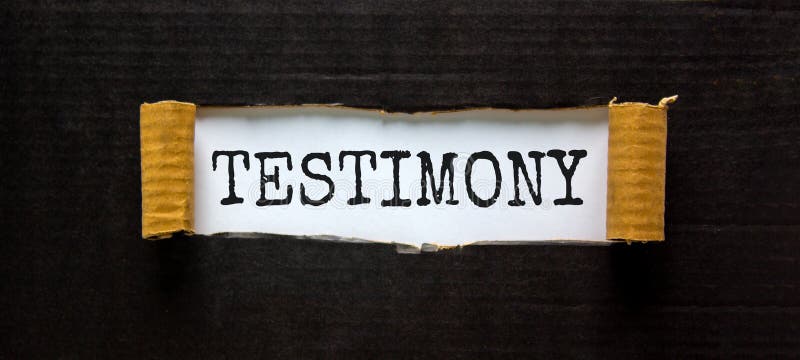Testimony
Introduction
Testimony is a solemn declaration usually made
orally by witness oath on response to interrogation
by a lawyer or authorized public official. In
philosophy , testimony is a statement that is
considered the language and knowledge which
occurs, when beliefs are transferred between
speakers and hearers through testimony.
Actually
this is a true manifestation which is occurred to be
accepted and to be understood for the certain events
or concepts. In modern society, many of
individual’s beliefs are derived directly from
testimony or depend for their grounding on other
beliefs.In the philosophy, the primary concern of regarding
testimony as to the epistemological. Epistemological
of testimony concern how we should evaluate our
beliefs. Epistemology is often defined as the theory
of knowledge, and talk of the propositional
knowledge has dominated the bulk of modern
literature in epistemology. Essential understanding
is epistemic ascent, the rising above bare knowledge
to assess, appraise, compare, contrast, emphasize,
connect and so on.
NORMATIVE AND DESCRIPTIVE
Our basic topic of testifying can be divided into two
dimensions. There are normative epistemology and
descriptive psychology. Normative epistemology
mostly deals with first-order theorizing about how
we should form justified beliefs, gain understanding,
truth and knowledge, offer accounts of the basic
sources of knowledge (like memory, perception,
testimony) and so forth.
Descriptive psychology
will tell us what human belief acquisition through
testimony is actually like, and what extent of
dependence on testimony our belief systems actually
exhibit. we can divide our central issue about
testimony along two dimensions, yielding four
distinct questions to investigate
- Descriptive local question
- Normative local question
- Descriptive global question
- Normative global question
How do human hearers typically form belief in
response to testimony? In particular, do they just
trust their informant unthinkingly, blindly; or do
they somehow evaluate the informant for
trustworthiness, and believe what they are told only
if the evaluation is positive?
Normative local question
Normative local question
In what conditions, and with what controls, should a
mature adult hearer believe what she is told, on some
particular occasion?
What is the actual place of testimony-beliefs overall,
in a person's structure of empirical belief? What is the extent of dependence on testimony for grounding of our beliefs? And what is the relationship between
testimony and our other sources of empirical belief:
perception, memory, and deductive and inductive inference from empirical premises ?
Normative global question
how, if ever, can a system of beliefs with
uneliminated epistemic dependence on testimony be
justified?
IMPORTANT OF TESTIMONY
As I mentioned above about the effect of modern society, these expressions are mainly effective for court
and our knowledge. In court, every case which are
from civil case to criminal cases, are depended on testimony. Because in this modern society believes
testimony. Hence these statements are so important
for identifying the exact culprits and the witness
helps the courts to give correct judgment and justice
. When we consider the knowledge, mainly there use to change myths, concepts, and subjects matters.
Also, there is used to understand and believe for the correct information to humans.
REFERENCES
a. Fricker, E., 2004. Testimony: Knowing
through being told. In Handbook of
epistemology (pp. 109-130). Springer,
Dordrecht.
b. Samuels, R., Stich, S. and Faucher, L.,
2004. Reason and rationality. In Handbook
of epistemology (pp. 131-179). Springer,
Dordrecht


Comments
Post a Comment